I’m extremely excited to find that the book written by the man who to me most epitomizes the history of British football is available free online.
John Cameron was a Scot who began his career playing for the great amateur side Queens Park. He went on to star for Everton, then won the FA Cup with Spurs in front of 114,000 people at Crystal Palace. He coached in Germany before World War One and was interned at the Ruhleben camp in Berlin alongside, amongst others, Steve Bloomer.
The whole book is interesting. But you might like to see what Cameron has to say about one area that is perceived above all to have changed since the Edwardian era: training. He doesn’t like drinking or smoking..! ‘Again and again I have watched mere lads of fourteen and fifteen, as well as young men of twenty-five, come on to the cricket and football field smoking those horrible, cheap, inferior ” fags.”‘ There’s no mention of any real skills training in this chapter, although the book has “tips and tricks” aplenty elsewhere in it.
CHAPTER V. Training.
NOT the least important thing about football is the matter of training, and nearly every professional club has a trainer, whose business it is not only to get the men fit, but also to keep them so for eight months. I have spoken to a great many whose work it is to get their men into condition and keep them so, and I find that a great many of them have different methods, but nearly all are agreed that every individual must be taken by himself. The majority of people, however, are not paid players, although, as I have already said, these are largely increasing in number, because year by year we see fresh clubs springing up, besides which every member of an ordinary club should be bound to turn out in as perfect a condition as possible. Many make a practice of walking to and from their work, and this in itself is excellent. When Montague Holbein was training for his Channel swims he used to make a practice of walking from Catford to the City, and also back, a distance of several miles, and this he found very valuable indeed. In the early days of some of the more important clubs a great many of the players who were professionals went to their ordinary occupations all the week and used to play on a Saturday. When West Bromwich Albion, captained by William Bassett, won the English Cup against Preston North End twenty years ago, the Midlanders were all local lads, whose wages totalled about ten pounds a week, while Preston’s pay-list was four times as much. Indeed, men who are regularly at work, especially if it be out of doors and if it taxes one’s bodily powers, need very little training. No one ought to play football unless he has a sound constitution, and every organ in the body must be sound, especially the heart and lungs; it is a game for those who are healthy and vigorous. A good plan is to pursue some exercise during the “close” season, i.e., the summer months. Professionals will tell you that August is their hardest month, a large number of them having done nothing since the end of April. Their muscles have become stiff, and they have probably too much surplus flesh. It is very different where professionals take up first class cricket, and trainers have frequently told me that those professionals and amateurs who play the summer game require little or no preparation, and there are many instances of that. Take, for instance, J. Sharp, the famous Everton forward. He must be getting on in years, and yet. season after season he plays cricket up till the end of August and then turns up at Goodison Park and shows how well he can carry the ball along and whip it into goal, like “a rocket, though not so straight up,” as one great judge has written of him. He has been an International this year. He has done splendid work as a cricketer, and is second on the list of Lancashire averages, and may be described as one of the greatest all-round men in England. Now, in his thirty-first year, he has given evidence that if you keep in condition there is no need to worry about special preparation or anything of the sort. Another instance is E. Needham, the captain of Sheffield United, and perhaps the greatest half- back for many years that we have had. He is now thirty-five, and it is a long time since he played his first International match, and long before he was a cricketer he had made his name as a footballer. He is a tireless worker, as anyone who has watched him with the Sheffield United club knows quite well, and long before his age many men have retired from the game. He has the respect and admiration of everyone, and this year he has come to the front as a cricketer and finished at the head of the Derbyshire averages. The result of his always keeping in condition is that he will probably go on for some years as a great cricketer, and as one career is on the wane the other seems to be beginning. He is great indeed at both games. Two other members of the Sheffield United club have also made their presence felt at the summer game. I refer to the two half-backs, the brothers Wilkinson. W. H., the half-back, has never done better as a cricketer. He is a left- handed batsman, and has made a great advance on anything he has done before, while B. Wilkin- son is a player of some repute. Lewis, of Somerset ; Makepeace, of Lancashire ; Ducat, of Surrey ; Iremonger, of Notts; and Leach and Vincett, of Sussex, are all cricketers who have done splendid work during the summer game, and have turned out footballers perfectly fit at the beginning of the season. Indeed, if you play cricket as it should be played it is magnificent training for football. It is hard work getting fit at the start of the season if you have allowed your muscles to become flabby, while there may be no regular circulation of the blood, and generally the muscles that you require are very lethargic, so the difficulty is with those who do not play tennis or cricket, or go in for rowing or swimming or some other form of active exercise during the summer, that they will have to take up some serious practice. Skipping is good, walking and running, especially short sprinting, while punch-ball exercise and dumbbells may be used. There should be moderation in all things, and one must start carefully at first and increase the amount of training until one feels fit. During the season walking and some practice at kicking, with an occasional sprint, are quite enough to keep the player well. It is quite possible that some may suffer from the tremendous amount of energy that they put into their game. I do not think that those who work indoors, such as clerks and others who are called upon to follow indoor occupation, require more than moderate regular exercise. It is very likely that they will have to do their training after or before business hours, and in the evening brisk walking of a couple of miles, with a sprint of 100 yards four or five times, is a good way of getting rid of superfluous fat, and everyone can do this if he likes, though laziness will often lead some to shield themselves under the excuse, ” They have no time.” One well-known forward, thoroughly conscientious in his training, used to exercise on the Embankment, an excellent plan. Everyone who has to work sitting down should take a morning bath and a little practice with a skipping rope or dumb-bells. The question of diet is of some importance. The game is so strenuous and exhausting that a substantial meal should be taken at least two hours before a match. Many have a beef steak well cooked, with stale bread and vegetables that are well done, always excluding potatoes, and they are able to play right through the game without feeling in any way fatigued. The plainer the food the better. All players are better if they leave alone intoxicants. Needham earnestly advises young players to abstain from them. He says that his experience is that they do not sustain any long continued effort, and their stimulating effect is followed by an invariable depression. From my own observation of players who have abstained and those who have not, I am sure the former have done’far better than the latter. Plenty of Internationals and men whose names are household words are total abstainers. I remember Vivian J. Woodward at a dinner in the football season would neither touch intoxicating drinks nor smoke, and England’s captain knew what he was about. Kirwan, who captained Ireland; John Goodall, one of the props of the game; John Lewis, the famous penalty king; C. Williams, the Brentford and Tottenham goalkeeper; Ducat, of Woolwich Arsenal, are only a few of the total abstainers, and to them I might add R. M. Hawkes, International and the Luton captain. Indeed, if you want to be of the greatest value to your side you may take it from me that you will do better service by leaving alone all sorts of alcohol, and as to smoking, I am quite sure it is thoroughly bad. I see one picture which explains to me why a great deal of the slackness is creeping over our boys. Again and again I have watched mere lads of fourteen and fifteen, as well as young men of twenty-five, come on to the cricket and football field smoking those horrible, cheap, inferior ” fags.” How any captain can allow it is a great mystery to me, because if we are training for a match we always say do not smoke a day or two before, because it interferes with one’s staying powers. Yet I have seen boys come down to Tottenham smoking all the way from London, all the time they are changing, and actually come from the dressing room with cigarettes, and blow and blow away right to the moment of kicking off. Not content with that, they get through some more cigarettes at the interval, and then wonder why they are tired before the match is over. I have often begged of our youths if they wish to be athletes to remember that it means a certain amount of self- denial, and if they want to do their best for their side they will take this matter seriously to heart and remember that smoking and drinking intoxicants make one unfit rather than otherwise. I do not think that the ordinary player need think about special training, but if, on the other hand, stale- ness comes to him a complete rest is necessary. When you are overworked at the end of a long season your feet will seem heavy and your kicking will be uncertain, while you will fall and stumble about. This is the time to retire and make room for someone else. With a little care you will gain the necessary freshness, and you will be able to tell when you have got that, because you will be anxious to play the game.
CHAPTER V.Training.NOT the least important thing about football isthe matter of training, and nearly every profes-sional club has a trainer, whose business it is notonly to get the men fit, but also to keep them sofor eight months. I have spoken to a great manywhose work it is to get their men into conditionand keep them so, and I find that a great many ofthem have different methods, but nearly all areagreed that every individual must be taken by him-self. The majority of people, however, are notpaid players, although, as I have already said,these are largely increasing in number, becauseyear by year we see fresh clubs spring-ing up, besides which every member of anordinary club should be bound to turn out inas perfect a condition as possible. Many make apractice of walking to and from their work, andthis in itself is excellent. When Montague Holbeinwas training for his Channel swims he used tomake a practice of walking from Catford to theCity, and also back, a distance of several miles,and this he found very valuable indeed. In theearly days of some of the more important clubs agreat many of the players who were professionalswent to their ordinary occupations all the week andused to play on a Saturday. When West Brom-wich Albion, captained by William Bassett, wonthe English Cup against Preston North Endtwenty years ago, the Midlanders were all locallads, whose wages totalled about ten pounds a week,while Preston’s pay-list was four times as much.Indeed, men who are regularly at work, especiallyif it be out of doors and if it taxes one’s bodilypowers, need very little training. No one ought toplay football unless he has a sound constitution, andevery organ in the body must be sound, especiallythe heart and lungs; it is a game for those whoare healthy and vigorous. A good plan is topursue some exercise during the “close” season,i.e., the summer months. Professionals willtell you that August is their hardest month,a large number of them having done no-thing since the end of April. Their muscleshave become stiff, and they have probably toomuch surplus flesh. It is very different whereprofessionals take up first class cricket, and trainershave frequently told me that those professionalsand amateurs who play the summer game requirelittle or no preparation, and there are many in-stances of that. Take, for instance, J. Sharp, thefamous Everton forward. He must be getting onin years, and yet. season after season he playscricket up till the end of August and then turnsup at Goodison Park and shows how well hecan carry the ball along and whip it into goal,like “a rocket, though not so straight up,” as onegreat judge has written of him. He has been anInternational this year. He has done splendidwork as a cricketer, and is second on the list ofLancashire averages, and may be described as oneof the greatest all-round men in England. Now,in his thirty-first year, he has given evidence thatif you keep in condition there is no need to worryabout special preparation or anything of the sort.Another instance is E. Needham, the captain ofSheffield United, and perhaps the greatest half-back for many years that we have had. He is nowthirty-five, and it is a long time since he playedhis first International match, and long before hewas a cricketer he had made his name as a foot-baller. He is a tireless worker, as anyone whohas watched him with the Sheffield United clubknows quite well, and long before his age manymen have retired from the game. He has therespect and admiration of everyone, and this yearhe has come to the front as a cricketer and finishedat the head of the Derbyshire averages. Theresult of his always keeping in condition is thathe will probably go on for some years as a greatcricketer, and as one career is on the wane the otherseems to be beginning. He is great indeed atboth games. Two other members of the SheffieldUnited club have also made their presence felt atthe summer game. I refer to the two half-backs,the brothers Wilkinson. W. H., the half-back,has never done better as a cricketer. He is a left-handed batsman, and has made a great advanceon anything he has done before, while B. Wilkin-son is a player of some repute. Lewis, of Somer-set ; Makepeace, of Lancashire ; Ducat, of Surrey ;Iremonger, of Notts; and Leach and Vincett, ofSussex, are all cricketers who have done splendidwork during the summer game, and have turnedout footballers perfectly fit at the beginning ofthe season. Indeed, if you play cricket as it shouldbe played it is magnificent training for football.It is hard work getting fit at the start of the seasonif you have allowed your muscles to becomeflabby, while there may be no regular circulationof the blood, and generally the muscles that yourequire are very lethargic, so the difficulty is withthose who do not play tennis or cricket, or go infor rowing or swimming or some other form ofactive exercise during the summer, that they willhave to take up some serious practice. Skippingis good, walking and running, especially shortsprinting, while punch-ball exercise and dumb-bells may be used. There should be moderation inall things, and one must start carefully at first andincrease thre amount of training until one feels fit.During the season walking and some practice atkicking, with an occasional sprint, are quiteenough to keep the player well. It is quite pos-sible that some may suffer from the tremendousamount of energy that they put into their game. Ido not think that those who work indoors, such asclerks and others who are called upon to follow in-door occupation, require more than moderateregular exercise. It is very likely that they willhave to do their training after or before businesshours, and in the evening brisk walking of acouple of miles, with a sprint of 100 yards fouror five times, is a good way of getting ridof superfluous fat, and everyone can do this if helikes, though laziness will often lead some to shieldthemselves under the excuse, ” They have notime.” One well-known forward, thoroughlyconscientious in his training, used to exercise onthe Embankment, an excellent plan. Everyonewho has to work sitting down should take a morn-ing bath and a little practice with a skipping ropeor dumb-bells. The question of diet is of someimportance. The game is so strenuous and ex-hausting that a substantial meal should be takenat least two hours before a match. Many have abeef steak well cooked, with stale bread and vege-tables that are well done, always excludingpotatoes, and they are able to play right throughthe game without feeling in any way fatigued.The plainer the food the better. All players arebetter if they leave alone intoxicants. Needhamearnestly advises young players to abstain fromthem. He says that his experience is that they donot sustain any long continued effort, and theirstimulating effect is followed by an invariabledepression. From my own observation of playerswho have abstained and those who have not, I amsure the former have done’far better than the latter.Plenty of Internationals and men whose names arehousehold words are total abstainers. I rememberVivian J. Woodward at a dinner in the footballseason would neither touch intoxicating drinks norsmoke, and England’s captain knew what he wasabout. Kirwan, who captained Ireland; JohnGoodall, one of the props of the game; JohnLewis, the famous penalty king; C. Williams, theBrentford and Tottenham goalkeeper; Ducat, ofWoolwich Arsenal, are only a few of the total ab-stainers, and to them I might add R. M. Hawkes,International and the Luton captain. Indeed, ifyou want to be of the greatest value to your sideyou may take it from me that you will do betterservice by leaving alone all sorts of alcohol, and asto smoking, I am quite sure it is thoroughly bad.I see one picture which explains to me why a greatdeal of the slackness is creeping over our boys.Again and again I have watched mere lads offourteen and fifteen, as well as young men oftwenty-five, come on to the cricket and footballfield smoking those horrible, cheap, inferior” fags.” How any captain can allow it is a greatmystery to me, because if we are training for a matchwe always say do not smoke a day or two before,because it interferes with one’s staying powers.Yet I have seen boys come down to Tottenhamsmoking all the way from London, all -the timethey are changing, and actually come from thedressing room with cigarettes, and blow and blowaway right to the moment of kicking off. Notcontent with that, they get through some morecigarettes at the interval, and then wonder why theyare tired before the match is over. I have oftenbegged of our youths if they wish to be athletes toremember that it means a certain amount of self-denial, and if they want to do their best for theirside they will take this matter seriously to heartand remember that smoking and drinking intoxi-cants make one unfit rather than otherwise. I donot think that the ordinary player need think aboutspecial training, but if, on the other hand, stale-ness comes to him a complete rest is necessary.When you are overworked at the end of a longseason your feet will seem heavy and your kickingwill be uncertain, while you will fall and stumbleabout. This is the time to retire and make roomfor someone else. With a little care you will gainthe necessary freshness, and you will be able totell when you have got that, because you will beanxious to play the gameCHAPTER V.Training.NOT the least important thing about football isthe matter of training, and nearly every profes-sional club has a trainer, whose business it is notonly to get the men fit, but also to keep them sofor eight months. I have spoken to a great manywhose work it is to get their men into conditionand keep them so, and I find that a great many ofthem have different methods, but nearly all areagreed that every individual must be taken by him-self. The majority of people, however, are notpaid players, although, as I have already said,these are largely increasing in number, becauseyear by year we see fresh clubs spring-ing up, besides which every member of anordinary club should be bound to turn out inas perfect a condition as possible. Many make apractice of walking to and from their work, andthis in itself is excellent. When Montague Holbeinwas training for his Channel swims he used tomake a practice of walking from Catford to theCity, and also back, a distance of several miles,and this he found very valuable indeed. In theearly days of some of the more important clubs agreat many of the players who were professionalswent to their ordinary occupations all the week andused to play on a Saturday. When West Brom-wich Albion, captained by William Bassett, wonthe English Cup against Preston North Endtwenty years ago, the Midlanders were all locallads, whose wages totalled about ten pounds a week,while Preston’s pay-list was four times as much.Indeed, men who are regularly at work, especiallyif it be out of doors and if it taxes one’s bodilypowers, need very little training. No one ought toplay football unless he has a sound constitution, andevery organ in the body must be sound, especiallythe heart and lungs; it is a game for those whoare healthy and vigorous. A good plan is topursue some exercise during the “close” season,i.e., the summer months. Professionals willtell you that August is their hardest month,a large number of them having done no-thing since the end of April. Their muscleshave become stiff, and they have probably toomuch surplus flesh. It is very different whereprofessionals take up first class cricket, and trainershave frequently told me that those professionalsand amateurs who play the summer game requirelittle or no preparation, and there are many in-stances of that. Take, for instance, J. Sharp, thefamous Everton forward. He must be getting onin years, and yet. season after season he playscricket up till the end of August and then turnsup at Goodison Park and shows how well hecan carry the ball along and whip it into goal,like “a rocket, though not so straight up,” as onegreat judge has written of him. He has been anInternational this year. He has done splendidwork as a cricketer, and is second on the list ofLancashire averages, and may be described as oneof the greatest all-round men in England. Now,in his thirty-first year, he has given evidence thatif you keep in condition there is no need to worryabout special preparation or anything of the sort.Another instance is E. Needham, the captain ofSheffield United, and perhaps the greatest half-back for many years that we have had. He is nowthirty-five, and it is a long time since he playedhis first International match, and long before hewas a cricketer he had made his name as a foot-baller. He is a tireless worker, as anyone whohas watched him with the Sheffield United clubknows quite well, and long before his age manymen have retired from the game. He has therespect and admiration of everyone, and this yearhe has come to the front as a cricketer and finishedat the head of the Derbyshire averages. Theresult of his always keeping in condition is thathe will probably go on for some years as a greatcricketer, and as one career is on the wane the otherseems to be beginning. He is great indeed atboth games. Two other members of the SheffieldUnited club have also made their presence felt atthe summer game. I refer to the two half-backs,the brothers Wilkinson. W. H., the half-back,has never done better as a cricketer. He is a left-handed batsman, and has made a great advanceon anything he has done before, while B. Wilkin-son is a player of some repute. Lewis, of Somer-set ; Makepeace, of Lancashire ; Ducat, of Surrey ;Iremonger, of Notts; and Leach and Vincett, ofSussex, are all cricketers who have done splendidwork during the summer game, and have turnedout footballers perfectly fit at the beginning ofthe season. Indeed, if you play cricket as it shouldbe played it is magnificent training for football.It is hard work getting fit at the start of the seasonif you have allowed your muscles to becomeflabby, while there may be no regular circulationof the blood, and generally the muscles that yourequire are very lethargic, so the difficulty is withthose who do not play tennis or cricket, or go infor rowing or swimming or some other form ofactive exercise during the summer, that they willhave to take up some serious practice. Skippingis good, walking and running, especially shortsprinting, while punch-ball exercise and dumb-bells may be used. There should be moderation inall things, and one must start carefully at first andincrease thre amount of training until one feels fit.During the season walking and some practice atkicking, with an occasional sprint, are quiteenough to keep the player well. It is quite pos-sible that some may suffer from the tremendousamount of energy that they put into their game. Ido not think that those who work indoors, such asclerks and others who are called upon to follow in-door occupation, require more than moderateregular exercise. It is very likely that they willhave to do their training after or before businesshours, and in the evening brisk walking of acouple of miles, with a sprint of 100 yards fouror five times, is a good way of getting ridof superfluous fat, and everyone can do this if helikes, though laziness will often lead some to shieldthemselves under the excuse, ” They have notime.” One well-known forward, thoroughlyconscientious in his training, used to exercise onthe Embankment, an excellent plan. Everyonewho has to work sitting down should take a morn-ing bath and a little practice with a skipping ropeor dumb-bells. The question of diet is of someimportance. The game is so strenuous and ex-hausting that a substantial meal should be takenat least two hours before a match. Many have abeef steak well cooked, with stale bread and vege-tables that are well done, always excludingpotatoes, and they are able to play right throughthe game without feeling in any way fatigued.The plainer the food the better. All players arebetter if they leave alone intoxicants. Needhamearnestly advises young players to abstain fromthem. He says that his experience is that they donot sustain any long continued effort, and theirstimulating effect is followed by an invariabledepression. From my own observation of playerswho have abstained and those who have not, I amsure the former have done’far better than the latter.Plenty of Internationals and men whose names arehousehold words are total abstainers. I rememberVivian J. Woodward at a dinner in the footballseason would neither touch intoxicating drinks norsmoke, and England’s captain knew what he wasabout. Kirwan, who captained Ireland; JohnGoodall, one of the props of the game; JohnLewis, the famous penalty king; C. Williams, theBrentford and Tottenham goalkeeper; Ducat, ofWoolwich Arsenal, are only a few of the total ab-stainers, and to them I might add R. M. Hawkes,International and the Luton captain. Indeed, ifyou want to be of the greatest value to your sideyou may take it from me that you will do betterservice by leaving alone all sorts of alcohol, and asto smoking, I am quite sure it is thoroughly bad.I see one picture which explains to me why a greatdeal of the slackness is creeping over our boys.Again and again I have watched mere lads offourteen and fifteen, as well as young men oftwenty-five, come on to the cricket and footballfield smoking those horrible, cheap, inferior” fags.” How any captain can allow it is a greatmystery to me, because if we are training for a matchwe always say do not smoke a day or two before,because it interferes with one’s staying powers.Yet I have seen boys come down to Tottenhamsmoking all the way from London, all -the timethey are changing, and actually come from thedressing room with cigarettes, and blow and blowaway right to the moment of kicking off. Notcontent with that, they get through some morecigarettes at the interval, and then wonder why theyare tired before the match is over. I have oftenbegged of our youths if they wish to be athletes toremember that it means a certain amount of self-denial, and if they want to do their best for theirside they will take this matter seriously to heartand remember that smoking and drinking intoxi-cants make one unfit rather than otherwise. I donot think that the ordinary player need think aboutspecial training, but if, on the other hand, stale-ness comes to him a complete rest is necessary.When you are overworked at the end of a longseason your feet will seem heavy and your kickingwill be uncertain, while you will fall and stumbleabout. This is the time to retire and make roomfor someone else. With a little care you will gainthe necessary freshness, and you will be able totell when you have got that, because you will beanxious to play the game.

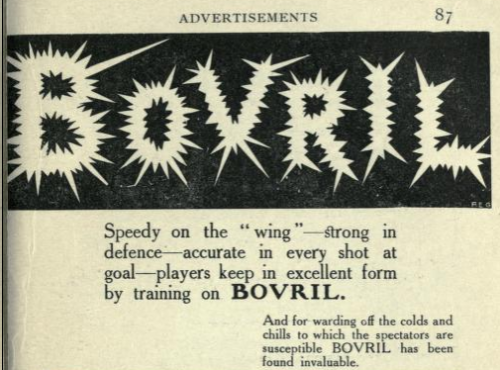

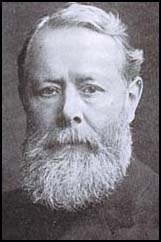
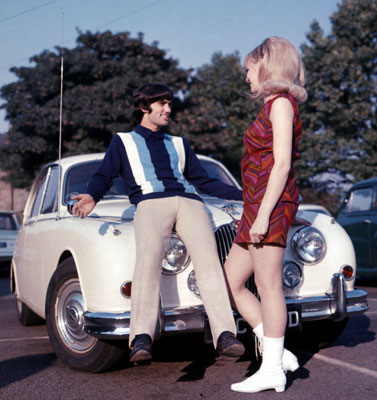
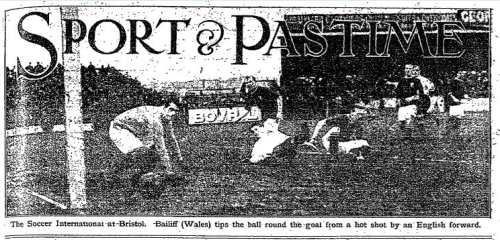
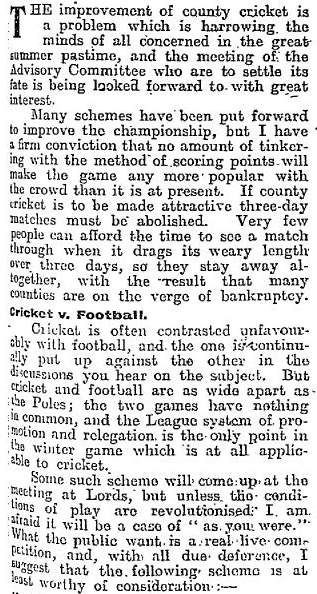
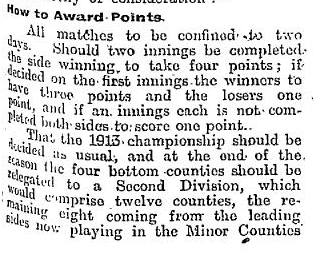
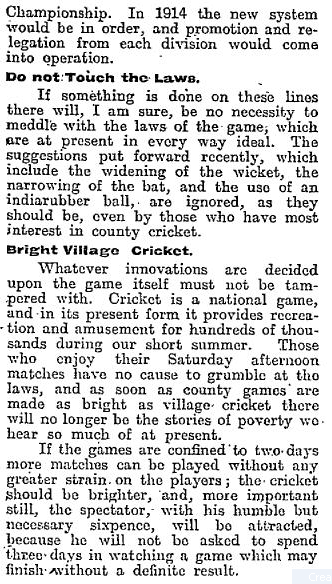 That action shot at the top of the page, by the way, which headlines the cricket piece as oddly in the PIP as it does here, was a commonplace by 1913. The days of the Illustrated London News’ artists were close to over by that stage, earlier, I suspect, than many think. I wish I knew where the plates for that kind of thing ended up. Earlier this year, I had a review copy of 1905’s The Men Who Made Association Football in my hands at an Edinburgh bookfair – with the original plates – not photogravure, the original prints themselves clear, clean and fresh.
That action shot at the top of the page, by the way, which headlines the cricket piece as oddly in the PIP as it does here, was a commonplace by 1913. The days of the Illustrated London News’ artists were close to over by that stage, earlier, I suspect, than many think. I wish I knew where the plates for that kind of thing ended up. Earlier this year, I had a review copy of 1905’s The Men Who Made Association Football in my hands at an Edinburgh bookfair – with the original plates – not photogravure, the original prints themselves clear, clean and fresh.